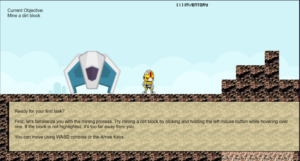Every year in our spring class, Design and Development of Games for Learning (CMS.590), students work in groups on three big projects – curriculum for an existing game, an original or modified tabletop game, and an original digital game. The final project is to create a 10-15 minute playable prototype of a digital game for learning. Students in the class come from all different academic backgrounds – some with experience in education, some with experience in games, and some who are just exploring. This year we had seven groups who developed prototypes. All of them can be played online at the links below.

Super Person – The game is to help learners aged 8-10 (grade 3-5) further develop their theory of mind and enhance their decision-making skills. The overarching goal is to foster empathy in the players to help them build more meaningful peer relationships and understand the impact of their choices. Since the game isn’t necessarily tied to a specific subject, it does not require any prerequisite knowledge or skill from the learners’ perspective. The teacher can also help them by reading the scenarios out loud and recapping the ones covered previously. Developed in Genialy.
Space Junkies – Space Junkies is a game designed for those with little to no background in classical mechanics to learn some of the core concepts used heavily in classical mechanics. Space Junkies is a puzzle solver set in an empty environment devoid of gravity and friction and attempts to teach concepts such as inertia and reactive forces in an intuitive sense through the vessel of play. Developed in Unity.
Robomania – Robomania is an interactive sandbox game designed to introduce robotic concepts to elementary school students in a science class or robotics elective. In this immersive game environment, players control the rotation of multiple robotic arms using simple keyboard commands. The goal is to engage players in completing various day-to-day household chores by developing an understanding of how to control the robots effectively. Developed in Unity.
Pokebility – Pokebility resembles a typical Pokémon game, with the in-game avatar of the player being “Ronnie,” a young adventurer who is preparing to go visit his grandmother in the neighboring town. Through his preparation process and journey, Ronnie encounters several challenges centered around the basic concepts of probability, in which he has to understand which of his actions is optimal according to the probabilities. Developed in GDevelop
Breaking Out – Breaking Out is an escape room that utilizes concepts from grade-level chemistry and biology. The game follows the story of a student trying to “break out” of a school by solving a series of small puzzles that can make up larger puzzles. Each level is represented by a room, and to advance to the next level the player must unlock the room they are currently in. The goal of the game is not only to help students solidify concepts in chemistry and biology, but also to challenge students’ problem solving skills. The game uses concepts involving the periodic table, macromolecules (such as carbohydrates, lipids, proteins, and nucleic acids), and chemical compounds. Developed in Genialy.
Newtons Loss – Newton’s Loss is an innovative educational game designed to introduce high school students to fundamental physics concepts through engaging and interactive gameplay. As a cooperative level-based puzzler, it encourages students to apply and experiment with physics principles in a virtual environment, making abstract theories tangible and accessible. The game not only enhances understanding through experiential learning but also fosters collaboration, critical thinking, and problem-solving skills. Developed in Unity.
Envirominers – Envirominers is a unique education game designed to immerse middle school students into the fascinating world of geology and environment science. Created with the intent to foster curiosity and provide foundational knowledge, this game sets players on a robotic journey to explore Earth’s geology through engaging gameplay and interactive learning. By adhering to the Next Generation Science Standards (NGSS) for Earth’s systems, the game introduces young learners to a variety of geological formations as well as the environmental stipulations in an enjoyable format. Developed in GDevelop.

